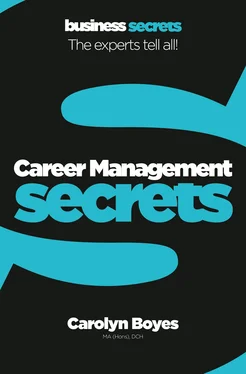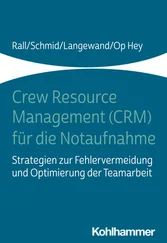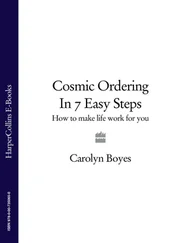Carolyn Boyes - Career Management
Здесь есть возможность читать онлайн «Carolyn Boyes - Career Management» — ознакомительный отрывок электронной книги совершенно бесплатно, а после прочтения отрывка купить полную версию. В некоторых случаях можно слушать аудио, скачать через торрент в формате fb2 и присутствует краткое содержание. Жанр: unrecognised, на английском языке. Описание произведения, (предисловие) а так же отзывы посетителей доступны на портале библиотеки ЛибКат.
- Название:Career Management
- Автор:
- Жанр:
- Год:неизвестен
- ISBN:нет данных
- Рейтинг книги:5 / 5. Голосов: 1
-
Избранное:Добавить в избранное
- Отзывы:
-
Ваша оценка:
- 100
- 1
- 2
- 3
- 4
- 5
Career Management: краткое содержание, описание и аннотация
Предлагаем к чтению аннотацию, описание, краткое содержание или предисловие (зависит от того, что написал сам автор книги «Career Management»). Если вы не нашли необходимую информацию о книге — напишите в комментариях, мы постараемся отыскать её.
Career Management — читать онлайн ознакомительный отрывок
Ниже представлен текст книги, разбитый по страницам. Система сохранения места последней прочитанной страницы, позволяет с удобством читать онлайн бесплатно книгу «Career Management», без необходимости каждый раз заново искать на чём Вы остановились. Поставьте закладку, и сможете в любой момент перейти на страницу, на которой закончили чтение.
Интервал:
Закладка:
1.1 Be an entrepreneur
Do you take responsibility for your career or do you let your career just happen to you? In the old way of doing things you would leave school or university and expect to have a job for life. But with a changing world you need to stop and take stock.
The world is changing so rapidly now that there is no guarantee you will have a job for life, nor that the company you join will continue to exist, nor even that your industry will still exist in the next decade or so. There is only one thing you can do in a world like this, and that is to be an entrepreneur.
Entrepreneurs assume that they will have to make their own fortune (and I mean fortune in the sense of both luck and money). Entrepreneurs don’t let things happen to them, they make things happen for them. This can be expressed by an equation: cause > effect.
one minute wonderTake a step back. Think about where you are in your career right now. Decide to make your career successful and fulfilling every day. You are in charge.
“The greatest discovery of my generation is that a human being can alter his life by altering his attitude of mind” William James, psychologist
• On which side of the equation are you?Do you cause the situations you are in or are you generally at the effect of what other people do? Are you an entrepreneur or are you passive ?
• Decide for yourself.You can use the equation cause > effect as a reminder to take responsibility for your career decisions.
The self-employed are entrepreneurs. Every day, they take responsibility for making their careers as successful as possible. On the other hand, many employees of both large and small companies fall into the habit of being passive. They turn up to work on time and assume that as long as they do everything adequately, then their working lives will continue at an even pace, and they will always be paid until 30 or so years later the career comes to a close.
In the new world of rapid change this isn’t enough. Every employee needs to be ‘at cause’ for their career.
You need to think like an entrepreneur if you want to make the right kind of progress in your career.
1.2 Take a personal inventory
One of the first things you can do to get on track in your career is take a personal inventory. This means looking at what you are really good at. Include not only your work skills and knowledge but also your natural talents and personal strengths.
The most thorough way to do this is to list each job role or activity you’ve carried out in the past and analyse each in turn. Think about the skills you used as well as any knowledge you gained. You will probably identify certain skills that you use consistently more than others.
case studyThe first job Sally had was in insurance. She had to deal with numbers and information all day long. She was bored and constantly passed over for promotion. Sally spent 10 years thinking she would never have much of a career. Then her company went through hard times and her job was made redundant. Sally took the opportunity to take a hard look at her skills and experience. She took a psychometric test, which confirmed that she needed a job focused on people. Now she works in a small company doing direct sales. “My biggest skill is in talking to people,” she says. “I feel much happier and I have been so successful that I was promoted after a year!”
Next, look at the broad areas below. How do you rate your own skills in each of the areas: above average – good – average – below average? Write down the results.
• People. For example, influencing people, persuading, supporting, helping, negotiating with, selling to, entertaining or teaching them.
• Ideas. Being innovative, experimental, visionary or creative; being able to think well in the abstract, about future possibilities; how to change things for the better or improvise, design.
• Things. For example, manual work, dealing with machinery or equipment, using tools, having practical skills.
• Data. For example, handling details of numbers or information, interpreting and presenting data, IT, organizing and administrating.
Compare your list of the skills you have used in the past to the list of what you are good at. You can then make a new list combining the two: what you are good at and what you have experience in. This gives you an inventory of the strengths you will be selling in your career.
Find out whether you are naturally better with people, ideas, things or data.
1.3 Discover your STARs
What have you done in your career so far? What have you done that you are proud of? An achievement is something you have undertaken with a result attached. If you know what’s worked for you in the past, you can create more of the same type of achievement in the future and form a focused vision for your career.
The word achievement can sound quite scary to a lot of people. They tend to say, “I haven’t achieved anything” because an achievement sounds as if it should describe something huge like climbing Everest or becoming CEO of a company. But of course you have achieved lots of things, in your work life and in your personal life.
one minute wonderGain insight about what you value through your achievements. Look at each achievement and ask: “What is it about this achievement that is important to me?” If there isn’t anything important, then decide not to do more of this type of work. If all your valuable achievements are in your personal life then maybe your work is lacking, so stop and pay heed.
An achievement is simply an action you have taken with a successful ending. There is a very simple way of remembering it: the STARformat. Try writing this down.
• S = Situation.Think of a situation you have been in at work. Describe it in detail on your piece of paper.
• T = Task.What was the task you were given to do in this situation or what was the responsibility you chose to take on?
• A = Action.An achievement isn’t something that is passive. What was the action you took to carry out this task? Did you organize? Lead? Administer? Calculate? Sell? Persuade?
• R = Result.What was the positive result or benefit? Did it save money? Help people? Support a team? Make things more efficient?
Use your career achievements to work out your skills (also known as competencies). Take an achievement and write down what skills you used to get the result e.g. communication, leadership, teamworking. Which skills do you use most?
To understand yourself better, start making a list of at least one achievement from every part of your career so far. It will help you to develop a list of your key skills. Remember, you can always transfer your skills from one job to another.
Use the STAR format to write down your achievements and work out what you do well.
1.4 Discover your three Ps
It’s no point being fantastic at your job if you hate it. You may make a reasonable career but you will lack any joy in what you do. The ingredients that make a career both fun and successful are Passions, Purpose and Principles. Get to know what yours are and make sure you include them in your career plan.
Your Passionsare the things you love doing, that interest you and bring joy into your day. The quickest way to discover your Passions are to make three lists:
• A list of the activities you need to have on a daily basis to make you feel satisfied.
Читать дальшеИнтервал:
Закладка:
Похожие книги на «Career Management»
Представляем Вашему вниманию похожие книги на «Career Management» списком для выбора. Мы отобрали схожую по названию и смыслу литературу в надежде предоставить читателям больше вариантов отыскать новые, интересные, ещё непрочитанные произведения.
Обсуждение, отзывы о книге «Career Management» и просто собственные мнения читателей. Оставьте ваши комментарии, напишите, что Вы думаете о произведении, его смысле или главных героях. Укажите что конкретно понравилось, а что нет, и почему Вы так считаете.












